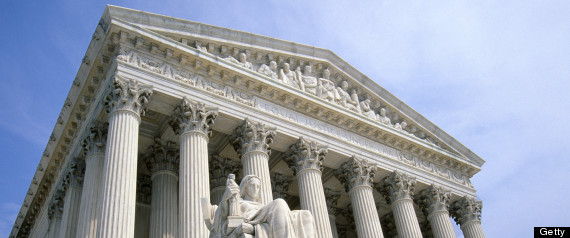
WASHINGTON, June 26 (Reuters) - America's top court was expected to
deliver rulings on Wednesday in two high-profile cases with national
implications on gay marriage, an issue that stirs cultural, religious
and political passions in the United States as elsewhere.
At 10 a.m. (1400 GMT), the nine justices of the U.S. Supreme Court were due to convene in Washington to issue rulings in the last three cases of its current session, two of them on same-sex marriage.
The court was due to rule on the constitutionality of a federal law that denies benefits to same-sex married couples and a California state law that bans gay marriage. Those cases, argued in March, could shape the debate over whether gay men and women should have the right to marry.
There are many possible outcomes, ranging from a broad decision proclaiming a fundamental right for gays to marry, which most experts say is unlikely, to more narrow decisions that are limited in scope.
Both cases came before the court with opinion polls showing growing support among Americans for gay marriage but division among the 50 states. Now, 12 states recognize it; more than 30 states prohibit it; and others have laws somewhere in-between.
The federal case concerns the Defense of Marriage Act (DOMA), which limits the definition of marriage as between a man and a woman for the purposes of federal benefits. It permits benefits such as Social Security survivor payments and federal tax deductions only for married, opposite-sex couples, not for legally married same-sex couples.
At 10 a.m. (1400 GMT), the nine justices of the U.S. Supreme Court were due to convene in Washington to issue rulings in the last three cases of its current session, two of them on same-sex marriage.
The court was due to rule on the constitutionality of a federal law that denies benefits to same-sex married couples and a California state law that bans gay marriage. Those cases, argued in March, could shape the debate over whether gay men and women should have the right to marry.
There are many possible outcomes, ranging from a broad decision proclaiming a fundamental right for gays to marry, which most experts say is unlikely, to more narrow decisions that are limited in scope.
Both cases came before the court with opinion polls showing growing support among Americans for gay marriage but division among the 50 states. Now, 12 states recognize it; more than 30 states prohibit it; and others have laws somewhere in-between.
The federal case concerns the Defense of Marriage Act (DOMA), which limits the definition of marriage as between a man and a woman for the purposes of federal benefits. It permits benefits such as Social Security survivor payments and federal tax deductions only for married, opposite-sex couples, not for legally married same-sex couples.
No comments:
Post a Comment